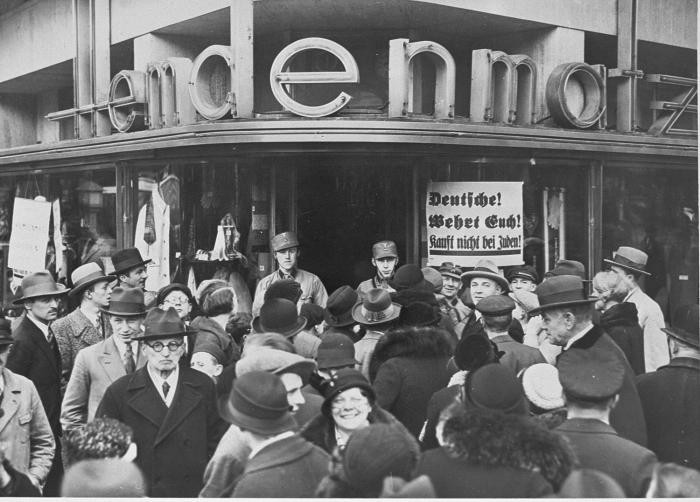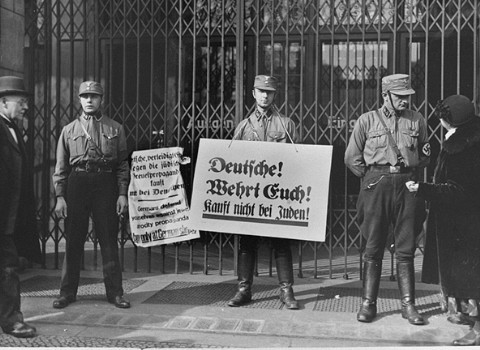
Boycott of Jewish Businesses
After Adolf Hitler came to power in Germany on January 30, 1933, the Nazi leadership decided to stage an economic boycott against the Jews of Germany. Local Nazi party chiefs organized the national boycott operation. Although it lasted only one day and was ignored by many individual Germans who continued to shop in Jewish-owned stores, it marked the beginning of a nationwide campaign by the Nazi Party against the entire German Jewish population.
Key Facts
-
1
The April 1, 1933, boycott aimed to intimidate Germany’s Jews and discourage the German public from shopping at Jewish businesses. It marked the beginning of Nazi efforts to drive Jews from the German economy.
-
2
The Nazis claimed that the boycott was a justifiable response to “international Jewry’s” criticism of Germany.
-
3
Newspapers in the United States widely covered the boycott, which generated international criticism of Nazi Germany.
After the Nazis came to power in Germany on January 30, 1933, the Nazi leadership decided to stage an economic boycott against the Jews of Germany.
Germany's Jewish Population
In 1933, about 600,000 Jews lived in Germany, less than one percent of the total population. Most Jews in Germany were proud to be Germans, citizens of a country that had produced many great poets, writers, musicians, and artists. More than 100,000 German Jews had served in the German army during World War I, and many were decorated for bravery.
Jews held important positions in government and taught in Germany's renowned universities. Of the 38 Nobel Prizes won by German writers and scientists between 1905 and 1936, 14 went to Jews. Marriage between Jews and non-Jews was becoming more common. Although German Jews continued to encounter some discrimination in their social lives and professional careers, many were confident of their future as Germans. They spoke the German language and regarded Germany as their home.
Nationwide Economic Boycott on April 1, 1933
On April 1, 1933, the Nazis carried out the first nationwide, planned action against Jews: a boycott targeting Jewish businesses and professionals. The boycott was both a reprisal and an act of revenge against Greuelpropaganda (atrocity stories) that German and foreign Jews, assisted by foreign journalists, were allegedly circulating in the international press to damage Nazi Germany's reputation.

On the day of the boycott, Storm Troopers (Sturmabteilung; SA) stood menacingly in front of Jewish-owned department stores and retail establishments, and the offices of professionals such as doctors and lawyers. The Star of David was painted in yellow and black across thousands of doors and windows, with accompanying antisemitic slogans. Signs were posted saying "Don't Buy from Jews" and "The Jews Are Our Misfortune." Throughout Germany, acts of violence against individual Jews and Jewish property occurred; the police intervened only rarely.
Beginning of a Nationwide Campaign
Although the national boycott operation, organized by local Nazi party chiefs, lasted only one day and was ignored by many individual Germans who continued to shop in Jewish-owned stores, it marked the beginning of a nationwide campaign by the Nazi Party against the entire German Jewish population. A week later, the government passed a law restricting employment in the civil service to "Aryans." Jewish government workers, including teachers in public schools and universities, were fired.
Critical Thinking Questions
- Investigate another boycott in local, national, or global history between 1933 and 1945. What was the issue? Was it successful? Why or why not?
- Why would citizens follow or ignore a boycott? What pressures and motivations might guide them? What options do citizens have when a boycott is announced?
- Is a boycott usually a political or economic effort? Can it be both? Are there other ways to hold a boycott?
- How can knowledge of the events in Germany and Europe before the Nazis came to power help citizens today respond to threats of genocide and mass atrocity in the world?

